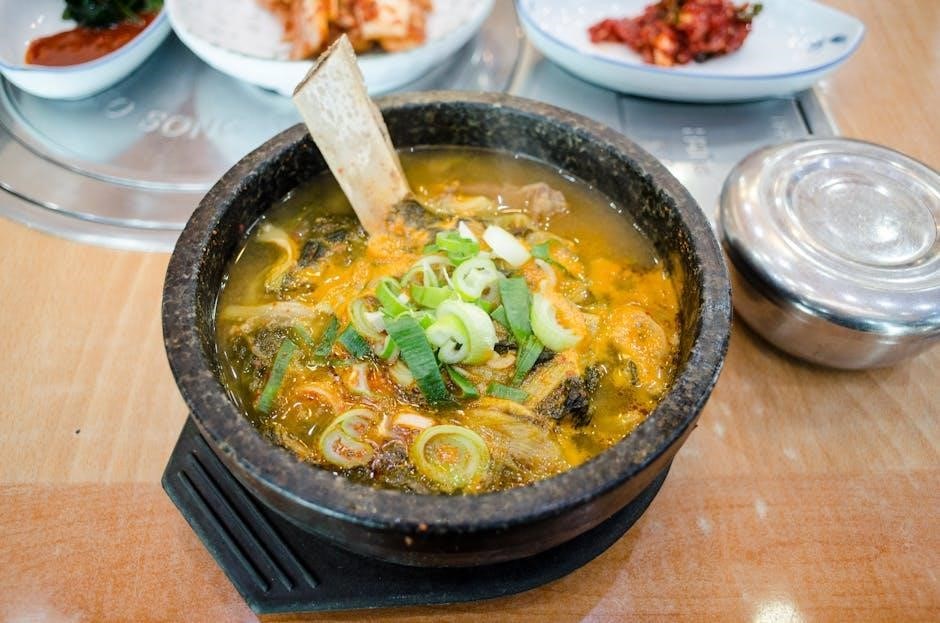Nourishing Traditions, by Sally Fallon and Mary Enig, challenges conventional nutrition wisdom, advocating for animal fats, cholesterol, and whole foods․ This comprehensive guide, available as a PDF, offers timeless dietary principles and recipes, promoting health and wellness through traditional foodways․
1․1 Overview of the Book
Nourishing Traditions, authored by Sally Fallon and Mary Enig, is a groundbreaking cookbook that challenges modern dietary norms․ It emphasizes the importance of traditional, whole foods and rejects politically correct nutrition․ The book provides a comprehensive guide to preparing nourishing meals, including recipes and meal plans․ It also explores the science behind traditional diets, highlighting the benefits of animal fats and cholesterol․ Available as a PDF, this revised edition offers timeless wisdom, encouraging readers to embrace ancestral foodways for optimal health․ Its detailed approach makes it a valuable resource for those seeking a holistic dietary lifestyle․
1․2 Importance of Traditional Foods
Traditional foods play a vital role in promoting health and well-being by preserving centuries-old culinary practices․ These foods, often rich in animal fats, cholesterol, and whole ingredients, provide essential nutrients for strong immunity, growth, and cognitive function․ Unlike modern processed diets, traditional foods emphasize natural, unaltered ingredients prepared through time-tested methods․ By adhering to these dietary practices, individuals can avoid the pitfalls of contemporary nutrition, fostering a healthier relationship with food and their bodies․ This approach is central to the philosophy of Nourishing Traditions, highlighting the enduring value of ancestral foodways․
1․3 The Role of Sally Fallon and Mary Enig
Sally Fallon and Mary Enig are the driving forces behind Nourishing Traditions, a cookbook that challenges politically correct nutrition․ Fallon, a renowned author and advocate for traditional diets, draws from Weston A․ Price’s research to emphasize the importance of whole, nutrient-dense foods․ Enig, a lipid biochemist, contributes her expertise on the benefits of animal fats and cholesterol․ Together, they reject modern dietary dogma, promoting a return to ancestral eating practices․ Their work has significantly influenced the movement toward whole, unprocessed foods and natural health practices, making them pioneers in the field of traditional nutrition․
Core Principles of “Nourishing Traditions”
Nourishing Traditions rejects politically correct nutrition, categorizing foods into nourishing, compromise, and newfangled․ It emphasizes whole, unprocessed foods, animal fats, and cholesterol as vital for optimal health and wellness․
2․1 Rejection of Politically Correct Nutrition

Nourishing Traditions boldly challenges mainstream dietary guidelines, questioning the demonization of animal fats and cholesterol․ Sally Fallon critiques the widespread adoption of low-fat diets, advocating instead for whole, nutrient-dense foods․ By rejecting politically correct nutrition, the book promotes a return to ancestral eating practices, emphasizing the importance of saturated fats and traditional preparation methods․ This stance is supported by historical and scientific evidence, offering a counterpoint to modern dietary trends that often prioritize convenience over health․
2․2 The Three Food Categories: Nourishing, Compromise, and Newfangled
The book introduces a framework of three food categories: nourishing foods, compromise foods, and newfangled foods․ Nourishing foods are traditional, whole, and nutrient-dense, such as animal fats, fermented dishes, and properly prepared grains․ Compromise foods, like whole grain bread, are modern but still acceptable․ Newfangled foods, including processed and highly refined items, are discouraged․ This classification helps readers make informed choices, aligning with ancestral diets and promoting optimal health by prioritizing time-tested, whole food options․
2․3 Emphasis on Whole, Unprocessed Foods
Nourishing Traditions emphasizes the importance of whole, unprocessed foods, rejecting modern trends that favor convenience over nutrition․ The book advocates for traditional practices like fermenting, soaking, and cooking from scratch to maximize nutrient absorption and health benefits․ By focusing on unaltered foods, readers can avoid harmful additives and preservatives found in processed alternatives, fostering a diet rich in vitamins, minerals, and enzymes essential for optimal well-being and longevity․

The Science Behind Traditional Diets
Nourishing Traditions explores the scientific basis of traditional diets, emphasizing the benefits of animal fats, cholesterol, and properly prepared grains․ Fermentation and soaking enhance nutrient availability, supporting overall health and vitality through timeless, evidence-based practices․
3․1 The Role of Animal Fats and Cholesterol
Animal fats and cholesterol are championed in Nourishing Traditions as essential nutrients for optimal health․ Fallon argues that these elements, often demonized, are vital for brain function, hormone production, and nutrient absorption․ Traditional diets emphasize whole, unprocessed sources like butter, lard, and organ meats, which provide fat-soluble vitamins․ Cholesterol is framed as a protective substance, not a villain, aligning with ancestral eating patterns․ This perspective challenges modern nutrition trends, advocating for a return to natural, whole-food sources of animal fats, as detailed in the PDF guide․

3․2 Proper Preparation of Grains and Legumes
Proper preparation of grains and legumes is vital in “Nourishing Traditions․” Techniques like soaking, sprouting, and fermenting break down phytic acid, enhancing nutrient absorption․ These methods, detailed in the PDF, restore digestibility and nutritional value, aligning with ancestral practices․ Fallon emphasizes that modern shortcuts often skip these steps, leading to deficiencies․ By reviving these traditional approaches, individuals can maximize the benefits of grains and legumes in their diet, ensuring optimal health and wellness․
3․4 The Importance of Fermentation
Fermentation is a cornerstone in “Nourishing Traditions,” enhancing nutrient availability and digestibility․ This ancient technique transforms foods like vegetables, dairy, and grains into nutrient-dense products․ Fermented foods are rich in vitamins, enzymes, and beneficial microbes, supporting gut health and immunity․ Fallon and Enig highlight how fermentation breaks down anti-nutrients, making minerals more bioavailable․ Traditional dishes like sauerkraut and kimchi exemplify this practice, promoting a vibrant, nutrient-rich diet that aligns with ancestral wisdom․ The PDF details methods to ferment at home, ensuring optimal nutritional benefits․

Benefits of Nourishing Traditional Foods
Nourishing traditional foods enhance overall health by boosting immunity, supporting robust growth, and improving cognitive function, aligning with ancestral dietary wisdom for optimal well-being․
4․1 Building Strong Immunity
Nourishing traditional foods play a crucial role in building strong immunity by providing essential nutrients and promoting a balanced gut microbiome․ Animal fats, cholesterol, and whole, unprocessed foods support immune function, reducing the risk of infections and chronic diseases․ Properly prepared grains and legumes, along with fermented foods, enhance nutrient absorption and strengthen the body’s natural defenses․ These dietary practices, rooted in ancestral wisdom, help maintain optimal health and resilience against pathogens, aligning with the principles outlined in the Nourishing Traditions guide․
4․2 Supporting Robust Growth and Development
Nourishing traditional foods are essential for supporting robust growth and development, particularly in children․ Rich in nutrients like animal fats, cholesterol, and vitamins, these foods promote healthy development and energy levels․ Properly prepared grains, legumes, and fermented foods ensure optimal nutrient absorption, fostering strong bones, teeth, and overall physical growth․ The emphasis on whole, unprocessed foods aligns with ancestral dietary practices, providing the necessary building blocks for children to thrive․ This approach, as outlined in the Nourishing Traditions guide, prioritizes nutrient-dense meals to support lifelong health and vitality․

4․3 Enhancing Cognitive Function
Nourishing traditional foods play a vital role in enhancing cognitive function by providing essential nutrients for brain health․ Rich in animal fats, cholesterol, and omega-3 fatty acids, these foods support the development and function of brain cells․ Properly prepared grains and legumes ensure optimal nutrient absorption, while fermented foods offer probiotics that improve gut-brain connection․ The diet’s emphasis on whole, nutrient-dense foods aligns with ancestral practices, fostering mental clarity and focus․ By avoiding processed foods, individuals can support long-term cognitive health and vitality, as highlighted in the Nourishing Traditions guide․

Specialized Diets and Lifestyles
Nourishing Traditions offers tailored dietary approaches for children, babies, and unique lifestyles, emphasizing natural care and optimal nutrition through traditional practices and whole foods, as detailed in its PDF guide․
5․1 The Nourishing Traditions Cookbook for Children
The Nourishing Traditions Cookbook for Children focuses on teaching kids the importance of whole, nutrient-dense foods through simple, delicious recipes․ This section of the PDF guide emphasizes traditional dietary practices, ensuring children develop healthy eating habits from a young age; It includes recipes and tips tailored for kids, making it easier for parents to instill a love for nourishing, ancestral foods․ The cookbook is a valuable resource for families aiming to prioritize health and wellness in their children’s diets, aligning with the broader principles of the Nourishing Traditions approach․
5․2 The Nourishing Traditions Book of Baby and Child Care
The Nourishing Traditions Book of Baby and Child Care provides a holistic approach to raising healthy children, emphasizing natural care practices․ This section of the PDF guide focuses on traditional wisdom, offering insights into optimal nutrition, breastfeeding support, and natural remedies for common childhood ailments․ Authored by Sally Fallon Morell and Thomas S․ Cowan, it combines ancestral knowledge with modern research to create a comprehensive resource for parents․ The book advocates for a diet rich in whole, nutrient-dense foods to support robust growth, strong immunity, and cognitive development in children․
5․3 Natural Baby Care Practices
Natural baby care practices, as outlined in the Nourishing Traditions PDF, focus on creating a healthy, chemical-free environment for infants․ The guide emphasizes breastfeeding support, natural remedies, and avoiding harmful additives․ It advocates for a return to traditional care methods, such as using natural fabrics and avoiding processed products․ Fallon and Cowan also highlight the importance of nutrient-dense diets for both mothers and babies, ensuring optimal health and development․ These practices align with the broader philosophy of Nourishing Traditions, promoting wellness through timeless, holistic approaches to childcare․
Modern vs․ Traditional Foodways
Modern diets often prioritize convenience and processed foods, while traditional foodways emphasize whole, nutrient-dense ingredients․ The shift from ancestral practices to industrialized food systems has led to declining health and nutrient deficiencies, as highlighted in the Nourishing Traditions PDF․
6․1 The Decline of Traditional Diets in Modern Society
The shift from traditional diets to modern, industrialized foods has led to widespread health issues․ Processed and convenience foods dominate contemporary diets, replacing nutrient-dense, whole foods․ This change, driven by fast-paced lifestyles and agricultural advancements, has eroded the practices of preparing and consuming foods as generations once did․ The Nourishing Traditions PDF highlights how this decline contributes to chronic diseases and nutrient deficiencies, urging a return to ancestral foodways for optimal health and well-being․
6․2 The Impact of Processed Foods on Health
The rise of processed foods has severely impacted public health, contributing to chronic diseases like obesity, diabetes, and heart conditions․ These foods, often high in refined sugars, hydrogenated oils, and artificial additives, disrupt the body’s natural balance․ Nourishing Traditions emphasizes that such products lack essential nutrients and promote inflammation․ Regular consumption of processed foods can impair digestion, weaken immunity, and even affect mental clarity․ The book advocates for a return to whole, nutrient-dense foods to restore health and vitality, aligning with ancestral dietary wisdom․
Practical Guidance for Adopting Nourishing Traditions

Nourishing Traditions offers practical advice for integrating traditional foods into daily life, including shopping tips, kitchen essentials, and meal planning strategies to simplify the transition to whole, nutrient-dense eating․
7․1 Shopping and Kitchen Essentials
Adopting Nourishing Traditions begins with restocking your kitchen with whole, unprocessed foods․ Prioritize high-quality ingredients like animal fats, raw dairy, and fermented foods․ Invest in essential tools such as a food grinder, slow cooker, and fermenting vessels․ When shopping, focus on seasonal, locally sourced produce and pasture-raised meats․ Avoid processed foods and opt for natural alternatives like sea salt and traditional sweeteners․ Organizing your kitchen with these fundamentals ensures ease in preparing nourishing meals, making the transition to traditional eating both practical and sustainable․
7․2 Meal Planning and Preparation Tips
Effective meal planning is key to embracing Nourishing Traditions․ Start by planning weekly meals, ensuring diversity and balance․ Prioritize batch cooking and leftovers to save time․ Incorporate traditional techniques like fermentation, sprouting, and soaking to enhance nutrient absorption․ Use animal fats for cooking and include raw or fermented foods in every meal․ Keep recipes simple and flavorful, leveraging spices and herbs․ Involve family members in meal prep to foster a connection with food․ This approach ensures nourishing, delicious meals that align with ancestral wisdom and modern health needs․
Nourishing Traditions remains a vital guide in the digital age, offering timeless wisdom on diet and health through its PDF availability and comprehensive insights, profoundly impacting modern health․
8․1 The Relevance of “Nourishing Traditions” in the Digital Age
In today’s fast-paced, technology-driven world, Nourishing Traditions remains highly relevant․ Its timeless principles of whole, nutrient-dense foods and traditional cooking methods resonate with health-conscious individuals seeking alternatives to modern processed diets․ The availability of the book in PDF format ensures accessibility, allowing readers to easily adopt ancestral dietary wisdom in their contemporary lifestyles․ This digital accessibility bridges the gap between past and present, making it a valuable resource for those striving to improve their health and nutrition in the modern era․
8․2 Final Thoughts on the PDF and Its Availability
The Nourishing Traditions PDF has become a sought-after resource, offering convenient access to its wealth of nutritional insights and recipes․ With over 3,137 views and 726 downloads, its popularity endures․ The digital format ensures that Sally Fallon’s groundbreaking work reaches a wide audience, making it easier for individuals to embrace traditional dietary practices; Its availability on platforms like Z-lib․org and Libgen further highlights its impact, providing readers with a user-friendly way to integrate ancestral wisdom into their modern lives for optimal health and well-being․




